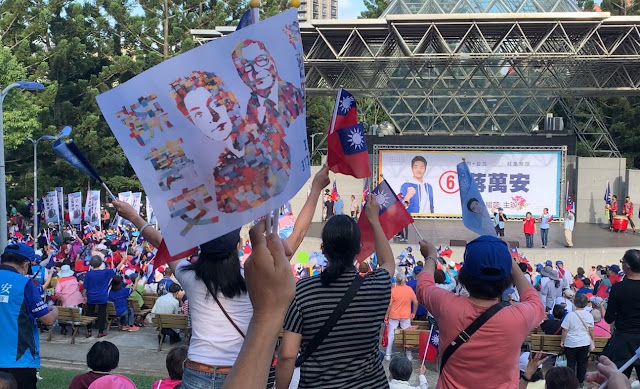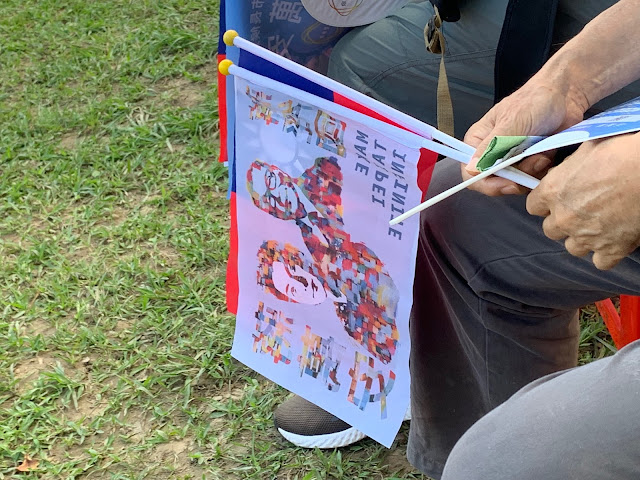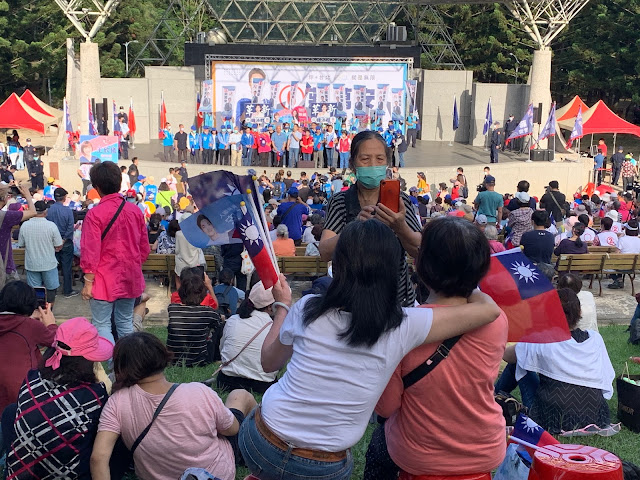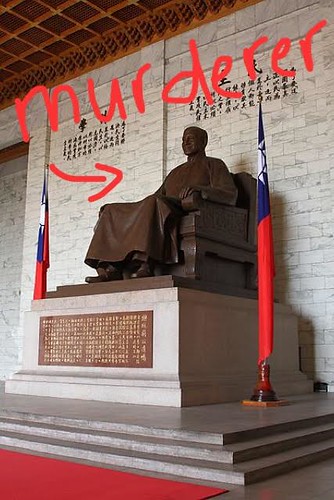
Sadly, I was fated to be there. For weeks I'd planned on attending the Da'an Forest Park free market to give away an IKEA bag full of stuff we no longer need. The Hakka Support Association (客家後援會) just happened to be hosting a Chiang rally at the amphitheater at the same time. I had no choice but to listen to utter bollocks for an hour and a half.
Most of what I listened to was some guy -- I didn't catch who it was -- going on a spittle-flecked rager about how horrible President Tsai, Chen Shih-chung and Huang Shan-shan were. They're all horrible, apparently, because of reasons. (I couldn't make out what the reasons were, and while that could be a fault with my Mandarin, I don't think that's why.)
Then some flag bearers and lion dancers welcomed Chiang onstage. Apparently Eric Chu was there as well, which I failed to notice from a distance, but he's not exactly Mr. Remarkable so that's fine.
His specific opinions, proposals and ideas were, well, lacking. He mentioned the new MRT line to Xizhi, which anyone elected would be trying to accomplish, and how northern Taiwan is now too expensive for the youth, which everyone already knows. That's more or less it.
Edited: I've had a longer look at this poster (it's very context-specific) and the three promises aren't as vague as I'd initially thought. The first says the rule for urban renewal will switch from 100% resident approval rate to 80%, the second that the amount of required public space in new developments will change (I'm not clear how) and the third -- well, I had to ask a friend about that as it's not clearly worded. But apparently the idea is they can 'force' or 'require' people in places slated for development or urban renewal to accept these new policies.
The policies themselves benefit mostly wealthy property owners.
He then went on to pull a strategy straight out of the skanky Republican playbook by pre-emptively accusing the other candidates of intending to "reverse the election", saying he was in a critical moment (true of all candidates), and "on thin ice" (which isn't true -- it's a tight race but again, it's tight for everyone.)

Oh yes, and he did the one thing I wish he really wouldn't do. The one weird trick that has caused my opinion on him to shift from apathy -- just another unqualified vacuous KMT hack who doesn't deserve the office he's likely to win -- he started leveraging his (purported) ancestral connection to the Chiang dictators, Chiang Ching-kuo in particular. (Chiang Kai-shek's name is political poison, as it should be).
I missed this part because I was petting a cute dog, which was frankly more engaging than Chiang's speech, but according to the Liberty Times, he said he'd "uphold the spirit of Chiang Ching-kuo, diligently loving the people and serving residents step by step".
Of course, Chiang Ching-kuo didn't love the people of Taiwan. He instigated major infrastructure projects, but he was also the head of secret police and absolutely knew that many of the people his own government sent to prison weren't getting fair trials. He actively helped to carry out the White Terror. According to the News Lens:
Jay Taylor, author of the Chiang the younger’s most well-known English language biography, “The Generalissimo’s Son,” notes that his subject was, according to those around him, an empathetic man who genuinely cared for the common people....However, the author confesses that this side of his personality was at odds with the reign of terror he inflicted upon the Taiwanese population as head of the National Security Bureau (NSB) after the KMT reforms of the early 1950s. His seemingly gentle and pliable nature also does not negate, in the minds of many who fought for Taiwanese democracy, his role in crushing dissent, both at home and abroad, throughout the period of martial law.
Defense Minister Bai Chongxi (白崇禧) arrived in Taiwan with the generalissimo's son, Chiang Ching-kuo (蔣經國), and wired a message to Chiang Kai-shek that "order is mostly restored, and we are in pursuit of the last remaining rebels that joined forces with armed thugs.”Does that sound like a guy who "loved the people and cared for residents step by step"? Because to me, he sounds like a butcher, and Chiang Wan-an is calling on him as a model of public officialdom.
Let me be blunt: that's fucked up.
This isn't the first time he's talked up the family, either. Here's just one example. From the Taipei Times:
Former presidents Chiang Kai-shek (蔣介石) and his son Chiang Ching-kuo (蔣經國) protected the Republic of China and contributed greatly to the development of Taiwan during the Cold War era, an achievement that should be the goal of any political party in Taiwan, Chiang Wan-an said.
The article cites Chiang's suggestion regarding the name of Chiang Kai-shek Memorial Hall as "forward thinking", but this sounds pretty backward to me.
He also actively leverages the connection:
In January, he said that his name “Wan-an” was given to him by his grandfather — former president Chiang Ching-kuo (蔣經國) — as a reminder of his ancestral roots. On more than one occasion, he stated that he has always been proud of being a Chiang, and that he would follow in his ancestors’ — Chiang Kai-shek (蔣介石) and Chiang Ching-kuo — footsteps to make Taiwan a better place. He further underscored this lineage by placing an artistic image of himself with Chiang Ching-kuo, side-by-side, on his mayoral campaign flags.
I know people who know Chiang Wan-an, and hear that is a nice guy in person. I don't doubt that's true. But he's not qualified to be mayor, and even if he were, calling on Chiang Ching-kuo as the sort of leader he'd want to emulate is absolutely not on.

To be clear, I would feel this way even if he weren't legally recognized as the former dictator's grandson. If you care about all that, here's a great Twitter thread by Taiwan resident David Demes.
But I don't really, because you can't help who your ancestors are. You can, however, control how you react to and discuss their legacy. On both fronts, Chiang has mostly failed: he's tied himself to brutal dictators. Butchers. Some of the worst criminals of history. Not just by taking the name, but in the way he talks about Chiang Ching-kuo's "loving" nature and treating him like an idol, when the man was absolutely a mass murderer.
I don't care that public perception of the younger dictator is somewhat better than his murderous father. He was still a butcher. He was an awful man. No infrastructure project can fix that.
I'm a little ambivalent about the whole Chiang Wan-an family saga though, because every time I say "he could just take a DNA test to prove the connection if he really wanted to", I feel a twinge of discomfort. It has 'birther' vibes, except with even less bodily privacy: as a human being, Chiang has every right to decide what he does or doesn't want to do with his genetic material.
The callbacks to Chiang Ching-kuo would be offensive and disgusting regardless of his parentage, so arguably, it doesn't matter. But Chiang himself makes it matter by bringing it up all the goddamn time. That's a choice.
He doesn't have to definitively confirm the connection, but he could choose to stop leveraging it, or could admit that his legally-recognized ancestors were bad people. "You can't choose your ancestors," he might say.
He didn't do that, today or any other day. He makes the connection. He asks his supporters to care. He pushes people to care, and he does so in the worst possible way. The most offensive way. That -- and not whomever his grandfather was -- is the problem.
As Focus Taiwan doesn't archive, here's the relevant bit:
Chiang is the son of former KMT Vice Chairman John Chiang (蔣孝嚴), and purported great-grandson of former President Chiang Kai-shek (蔣介石). In 2005, John Chiang changed his surname from Chang (章) to Chiang, and his family, including Chiang Wan-an, later followed suit.
I don't want to care, but I feel like Chiang is forcing me to care. He didn't have to do it this way. He chose it.
And my conclusion, from Chiang Wan-an shoving his family history in everyone's face, is this: whether or not he's genetically related to Chiang Ching-kuo, he talks about that murderous piece of shit as though he's some sort of heroic example, a person whose values as a government official are noble and worth emulating.
That is wrong, no matter who you are, or who your ancestors are.
I truly did not want to care, but I was made to care, and my opinion of Chiang Wan-an is much worse for it. He had so many choices available when coming to terms with his ancestry. He could have done right by it. He could have recognized the Chiang name for what it really means for Taiwan. He might even have won some goodwill from me (as though that matters).
Instead, he picked all the wrong paths, made all the wrong choices.
He's been described to me in personal terms, by people who know him in a personal capacity, as a friendly guy -- a decent person. He could have looked at his ancestry and decided to handle it in the way a decent person would. I would have respected that a lot.
He did the opposite.
That's not because of who his grandfather might have been. That's on him.













